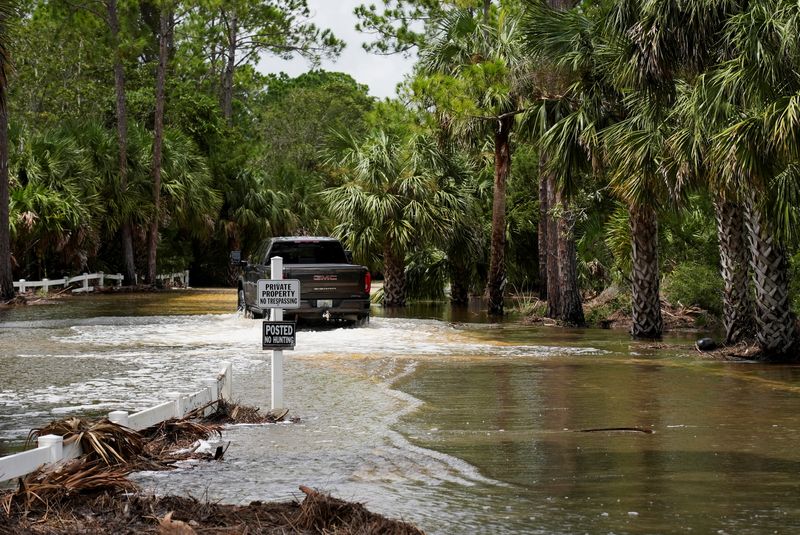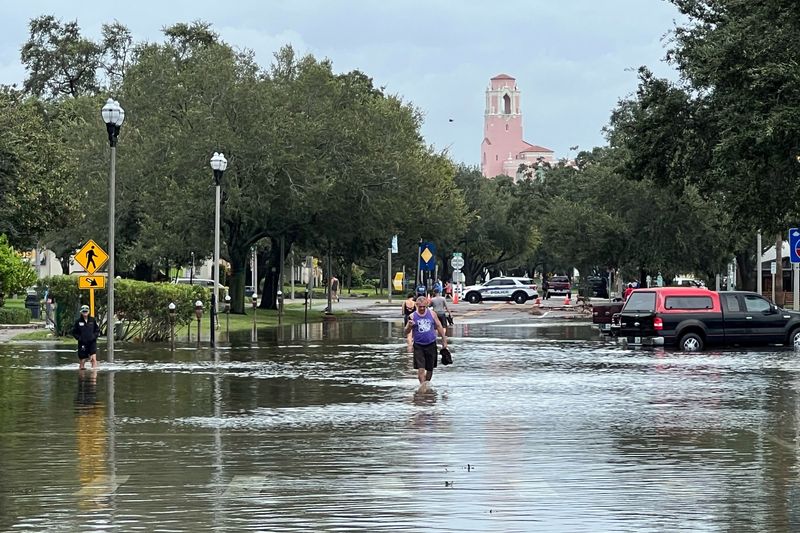By Noor Zainab Hussain, Chibuike Oguh and Jonathan Stempel
(Reuters) -Insurers were expected to face claims for billions of dollars from Hurricane Idalia which made landfall in Florida on Wednesday, adding to a challenging year for the industry that could result in higher premiums for customers.
Hurricane Idalia plowed into Florida's Gulf Coast with fierce winds, torrential rains and pounding surf before weakening but turning its fury on southeastern Georgia, where floodwaters trapped some residents in their homes.
In Florida, UBS bank estimated average insured losses of $9.36 billion with a 50% chance of losses of over $4.05 billion and a 10% likelihood of losses of $25.6 billion, based on Aug. 28 data. The wide range reflected potential changes in the storm's intensity and path.
At about $10 billion, Idalia would cost insurers less than 10 of the costliest hurricanes to hit the United States.
Global insurers are facing a challenging 2023 as reinsurers hiked rates on key types of coverage by as much as 50% from July 1, blaming sharp losses from the Ukraine war and increasing wildfires and hurricanes in states such as California and Florida.
"Historically, what happens when you have these hurricanes is that everyone gets worried about the liability following the hurricane," said Thomas Hayes, chairman and managing member of Great Hill Capital LLC in New York, adding that insurers typically end up being able to raise prices after such events.
The impact could have a knock-on effect on reinsurers, which insure insurance companies, and have been raising rates in recent years because of steepening losses that industry players partly attribute to the impact of climate change. Higher reinsurance rates can affect the premiums that insurers charge their customers.
Nationally, U.S. reinsurance rates for policies that had claims for natural catastrophes rose 30%-50% during July renewals, while in Florida the increase was 30%-40%, reinsurance broker Gallagher Re said in July.
FLORIDA PAIN
Florida has a large number of very small, thinly capitalized insurers, insurance experts have said.
Some insurance firms including Farmers Insurance, Bankers Insurance and Lexington Insurance, an unit of AIG (NYSE:AIG), have pulled out of Florida because of the risk of heavy losses, according to a July USA Today report.
A spokesperson for Farmers on Wednesday said that it had notified the Florida Office of Insurance Regulation of its decision to discontinue offering Farmers-branded auto, home, and umbrella policies in the state.
"This business decision was necessary to effectively manage risk exposure," the spokesperson said. "Farmers offers insurance through several different brands, and this decision applies only to policies issued through our exclusive agency distribution channel."
Lexington/AIG declined to comment, while Bankers Insurance did not immediately respond to a request for comment.
Citizens Property Insurance Corp, Florida's non-profit, state-backed insurance provider that is seen as an "insurer of last resort", has been gaining market share since 2022 as primary insurers reduce their exposure to the Florida market, UBS said in its note.
Citizens said on Wednesday it is well-capitalized to fund claims from policy holders whose properties are damaged by storms.
"There's no issue with us paying claims to policy holders," said Michael Peltier, a spokesperson for Citizens Property Insurance.

Berkshire Hathaway (NYSE:BRKa) Vice Chairman Ajit Jain said in May that he was happy with the reinsurance the conglomerate had written, but that Berkshire had an "unbalanced portfolio" and a big Florida hurricane would cause a "very substantial loss," according to a CNBC transcript of the event.
Berkshire did not respond to a request for comment.
